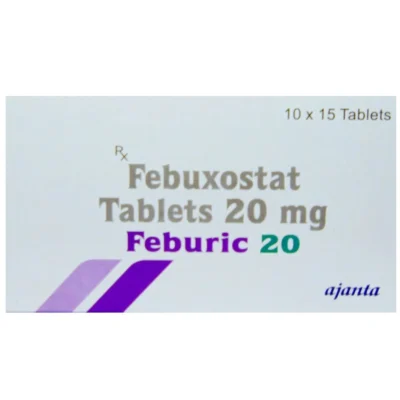🧬 Febuxostat 20 mg Tablet
Urate-Lowering Therapy for Gout Management
Overview
Febuxostat 20 mg is a xanthine oxidase inhibitor used primarily for the treatment of chronic hyperuricemia in patients with gout. It works by selectively inhibiting xanthine oxidase, the enzyme responsible for the conversion of hypoxanthine to uric acid. This leads to a reduction in serum uric acid levels, helping to prevent gout flares and related complications.
Brand Names: Febutaz, Feburic, Uloric (higher strengths)
Drug Class: Xanthine oxidase inhibitor
Dosage Form: Oral tablet
Indication: Gout, hyperuricemia (in patients who have failed or are intolerant to allopurinol)
Common Side Effects
These side effects are usually mild and temporary:
-
Liver enzyme elevation (transaminases)
-
Nausea
-
Joint pain or gout flares (especially during the initiation phase)
-
Headache
-
Diarrhea
-
Skin rash
-
Dizziness
Serious Side Effects
Although uncommon, serious adverse effects may include:
-
Cardiovascular events: Increased risk of heart-related deaths (especially in patients with pre-existing cardiovascular disease)
-
Severe allergic reactions: Stevens-Johnson syndrome, anaphylaxis
-
Hepatotoxicity: Marked elevation of liver enzymes or liver injury
-
Myelosuppression: Rare instances of neutropenia or thrombocytopenia
-
Renal impairment: Though less nephrotoxic than allopurinol, dose adjustment may be necessary in advanced renal disease
Seek immediate medical attention if any serious reactions occur.
Monitoring & Follow-Up
Ongoing assessment is crucial for safe and effective use:
-
Serum Uric Acid Levels: Monitor initially and periodically to assess efficacy
-
Liver Function Tests (LFTs): Baseline and periodic monitoring due to risk of hepatotoxicity
-
Renal Function Tests: Especially in patients with pre-existing kidney disease
-
Cardiovascular Status: Evaluate risk factors before initiating therapy
-
Gout Flare Risk: Use prophylactic NSAIDs or colchicine during the initial months
Patients should be advised not to stop treatment during a gout flare, as urate levels can rebound and worsen symptoms.
Warnings & Precautions
-
Cardiovascular Risk: Avoid in patients with a history of myocardial infarction, stroke, or unstable angina unless no other therapy is appropriate.
-
Hepatic Impairment: Caution in patients with liver disease; routine liver monitoring advised
-
Renal Impairment: Use cautiously in severe renal dysfunction (eGFR <30 mL/min)
-
Gout Flares: More frequent at the start of treatment; consider anti-inflammatory prophylaxis
-
Hypersensitivity Reactions: Discontinue immediately if serious skin reactions or systemic symptoms develop
-
Pregnancy & Lactation: Limited human data; use only if clearly needed
Summary
Febuxostat 20 mg is a targeted treatment for hyperuricemia in patients with gout, especially those who are intolerant or unresponsive to allopurinol. By inhibiting xanthine oxidase, it effectively lowers uric acid levels, reducing the frequency of painful gout flares and long-term joint damage. While it offers benefits over traditional therapy, Febuxostat carries notable cardiovascular risks, particularly in patients with heart disease, and requires close monitoring of liver, kidney, and uric acid levels. Appropriate patient selection, education, and follow-up are essential for maximizing benefits and minimizing harms.
Always follow your doctor’s advice, dosage instructions, and never self-medicate.
Note: This information is intended for educational purposes and should not replace professional medical advice. Always consult your healthcare provider for personalized recommendations.




Reviews
There are no reviews yet.